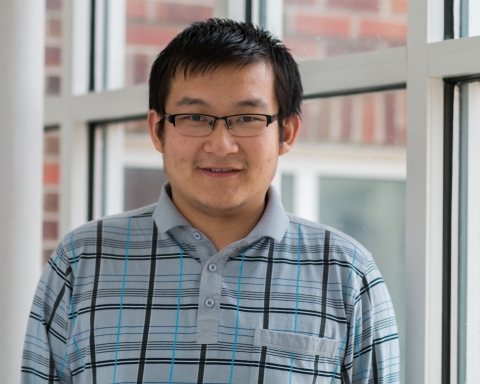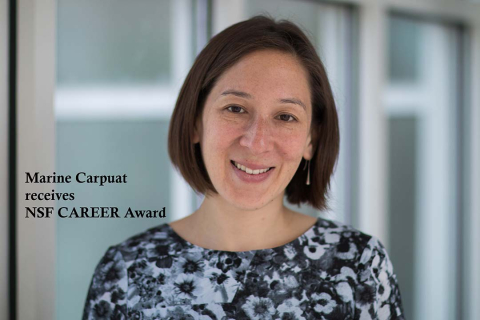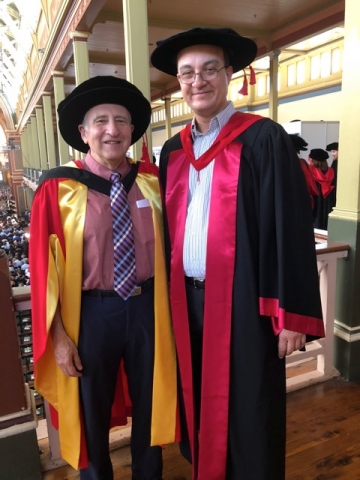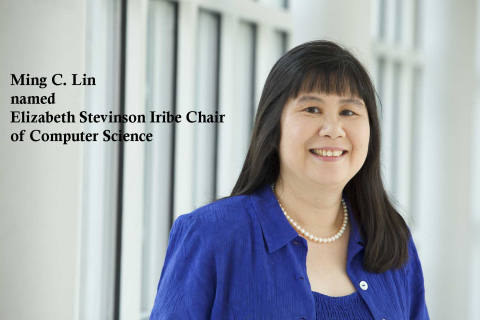Recent News & Accomplishments
2018
by Rebecca Copeland, Institute of Systems Research A team of four University of Maryland researchers has been awarded a nine-month, $646K grant from the Defense Advanced Research Projects Agency (DARPA) for "Robust Semi-Autonomous Swarm Tactics for Situational Awareness in Uncertain Environments." Assistant Professor Huan Xu (AE/ISR) is the principal investigator. The team also includes Assistant Professor Michael Otte (AE); Dinesh Manocha (CS/ECE/UMIACS), who will soon join the university as the Paul Chrisman Iribe Chair of Computer Science and Electrical and Computer Engineering; and Ming... read more
Computer Science graduate student Tongyang Li has been named a 2018 recipient of an IBM PhD Fellowship Award . Li is in the third year of his PhD program in the Department of Computer Science, and his research focuses upon theory aspects of quantum computing. Li is advised by Andrew Childs, a professor of computer science and co-director of the Joint Center for Quantum Information and Computer Science (QuICS). For his thesis, Li plans to work on theory aspects of quantum machine learning and optimization. Last year, Li published articles on quantum query complexity and quantum algorithms. He... read more
This article is republished from Terp Magazine online : Brin Family Gift Supports Both Sides of Science of Computing BY CHRIS CARROLL Sam Brin ’09 has nothing but praise for the University of Maryland Department of Computer Science, which famously launched his elder brother, Sergey ’93, on the path to becoming a founder of internet behemoth and computing kingpin Google … But, in retrospect, if he had just one little critique, he’d have benefited from greater integration of the hardware side of the discipline in his studies. That’s why nearly half of a new $2 million gift from the Brin family... read more
Professor Eytan Ruppin of the Department of Computer Science and UMIACS and Professor Christoph Kaleta , Cluster of Excellence Inflammation at Interfaces from Kiel University, Germany led a team of researchers who examined the relationship between degerative diseases--which are the result of aging--and cancer. In order to complete this study, the team "compared changes in the activity of genes during aging from humans, mice, the zebrafish Danio rerio and the short-lived killifish Nothobranchius furzeri across several organs." Their work entitled "Transcriptomic alterations during ageing... read more
On Wednesday, January 17, 2018, Professor of Computer Science and Fraunhofer CESE Executive Director Adam Porter participated in a panel of thought leaders on the challenges and opportunities in implementing Industry 4.0--the next wave in smart manufacturing. The “Future Impact of the 4th Industrial Revolution on Maryland Manufacturing” (https://rmiofmaryland.com/maryland-manufacturers-insights/ ) was hosted by the Baltimore-based Regional Manufacturers’ Institute of Maryland (RMI). The panel attracted over 260 participants from the manufacturing community, government, non-profits, and the... read more
Marine Carpuat , an assistant professor in the Department of Computer Science and the Institute for Advanced Computer Studies at the University of Maryland, has been named a recipient of the National Science Foundation (NSF) CAREER award for her work entitled Semantic Divergences Across the Language Barrier . Carpuat’s research focuses on the problem of translation—which is more complicated than simply translating words, or finding cognates between and among languages. Carpuat demonstrates how the act of translating languages also involves a rendering of culture perspectives and understanding... read more
On January 3rd 2018, a team of researchers including Dr. Daniel Genkin published Spectre Attacks: Exploiting Speculative Execution , as well as Meltdown , two notable papers that details security flaws in the world’s computer processors. The papers detail inherent security flaws in speculative execution, a technique used by virtually all modern processors to increase performance by guessing future paths of execution by executing them early. As speculative execution makes machines work faster and more efficiently, it is used in a variety of microprocessors from Intel, AMD, and ARM, which are... read more
On December 13, 2017, Emeritus and Distinguished University Professor Ben Shneiderman was the recipient of prestigious Doctor of Engineering (Honoris Causa) from the University of Melbourne, “in honour of his significant impact in research and commercial applications in the fields of HCI and information visualization.” His nomination was initiated by Egemen Tanin (PhD, ‘01) and Frank Vetere, both professors in computer science. During his visit, Shneiderman gave an inspiring six-minute commencement address during an extremely warm day (95 degree Fahrenheit). The university also invited him to... read more
2017
Ph.D. student Zuxuan Wu is a now a member of Snap, Inc.'s first class of research fellows . Wu joins eleven other Ph.D. students from universities around the country who specialize in areas ranging from HCI, to computer vision, to machine learning. Wu is a first year Ph.D student in the Department of Computer Science and his advisor is Professor Larry Davis. Wu's specialty is machine learning and his work has already been published in seven papers. He earned a master's degree from Fudan University with Professors Yu-Gang Jiang and Xiangyang Xue. He has also worked as an intern with Dr. Leonid... read more
An expert in virtual reality, computer graphics and robotics, Lin joins UMD from the University of North Carolina at Chapel Hill.
Ming C. Lin will lead the University of Maryland’s Department of Computer Science, effective January 1, 2018. A noted educator and expert in virtual reality, computer graphics and robotics, Lin will assume the role of Elizabeth Stevinson Iribe Chair of Computer Science with a joint appointment in the University of Maryland Institute for Advanced Computer Studies (UMIACS). As chair, she will oversee a department that has experienced significant increases in student enrollment; expanded its research in virtual and augmented reality, robotics, machine learning, cybersecurity and quantum... read more







